Hetzner Cloud recently announced new cloud plans in the CX line and also scheduled the deprecation of the previous generation of the CX servers by the end of the summer. We were eager to compare the pricing and expected performance details of both the old and the new servers at the same time, while we still could.
Spare Cores makes it easy to compare the pricing, hardware features and
benchmark scores of any number of servers. Simply select the servers
on our server listing pages
(e.g. you can filter for the Hetzner Cloud servers,
and also include inactive ones), then click the "Compare" button.
To save you time, we've provided a direct link to the comparison page of all hcloud servers with 2 vCPUs and 2-4 GiB of memory.
Screenshots from that page are also included below.
Pricing #
The price change between the lowest-end CX servers brings good news: the CX22 costs only €0.0052, while the CX21 used to cost €0.0079 per hour (excluding VAT and the optional IPv4 pricing):
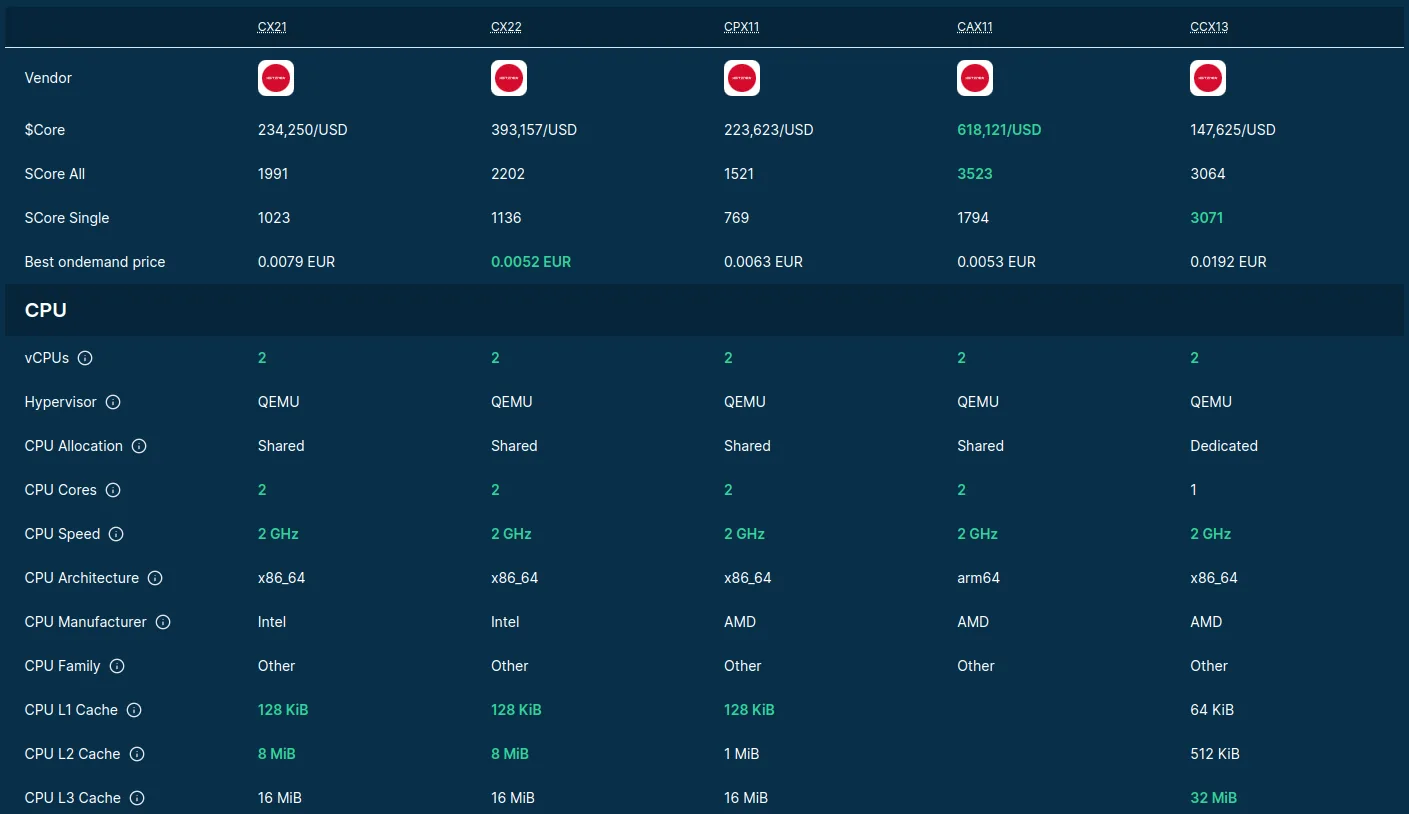
Pricing and CPU features comparison
That's a massive 35% cost reduction!
General CPU performance #
Still focusing on the first few lines of the above comparison table,
you can also see that the new CX22 server offers approximately 10% better
performance compared to the CX21 based on both the single-core and
multi-core Spare Cores Scores (SCore). When looking at the price
per performance ($Core), the upgrade is even more evident: there's a
boost from around 250k/USD to 400k/USD.
Although these derived metrics depend on many uncontrollable factors, such as the USD/EUR exchange rate (as "performance per price" is always standardized to USD at Spare Cores), and the load of other virtual servers running on the same hosts -- repeated benchmarks at different times of the day yielded similar scores, and overall results proved to be relatively reliable. We plan to blog about running benchmarks on parallel virtual machines and for longer time periods to try to account for the neighboring node impact, but more on that later.
Hardware features #
There are no visible differences in CPU features between CX21 and CX22; both use shared logical CPU cores from the Intel® Xeon® Gold family. We included a few extra Hetzner Cloud nodes with 2 AMD vCPUs and 2-4 GiB of memory to be able to compare the similar instance types from other product lines as well. Note that the CCX13 has a dedicated CPU core, unlike any other above-listed servers.
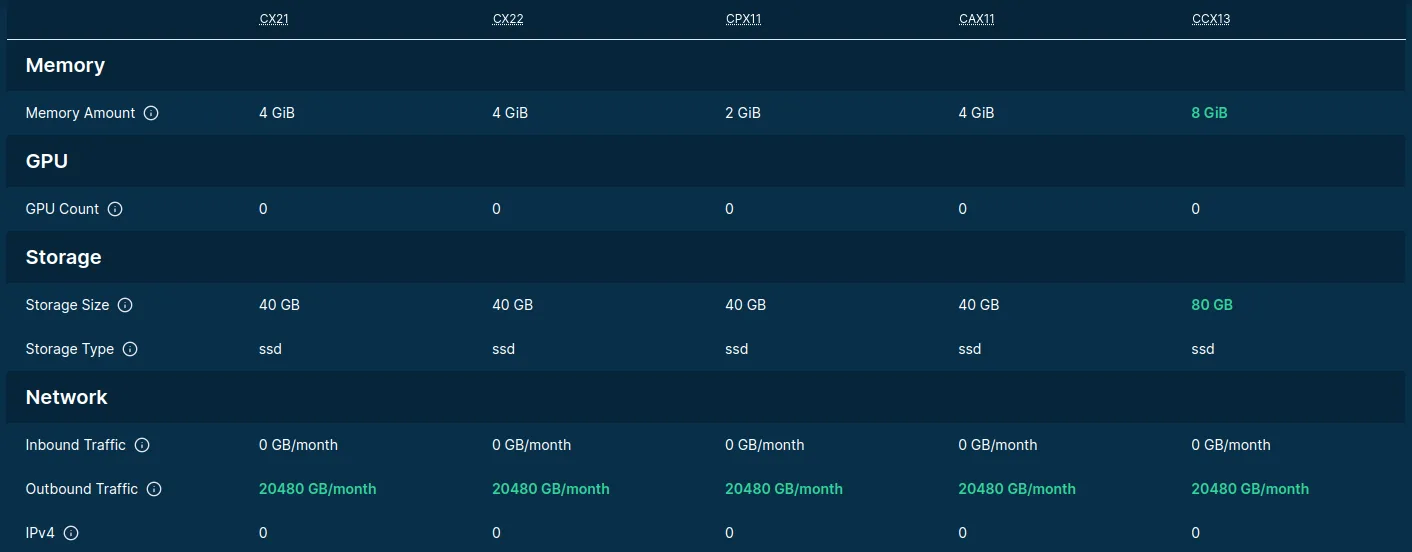
Memory, storage and network features comparison
Looking at the related memory, storage and network offerings, there is a difference in the amount of memory (the CPX11 comes with only 2 GiB and the CCX13 comes with 8 GiB of memory), but as most benchmarks depend on the CPU's performance without much impact from the available memory amount, we assume the below comparisons to be still useful.
Note that the memory module details are rather incomplete in the above table,
e.g. memory speed or the memory modules' generation (such as DDR4 VS DDR5)
are not listed, because although we run hardware inspector tools on the machines,
the hypervisor (QEMU in this case) hides that information from us.
Benchmarks #
Now the more interesting part!
Let's start by looking at the Geekbench overall scores and the various benchmarking workloads, both on a single core and all (two) available cores:
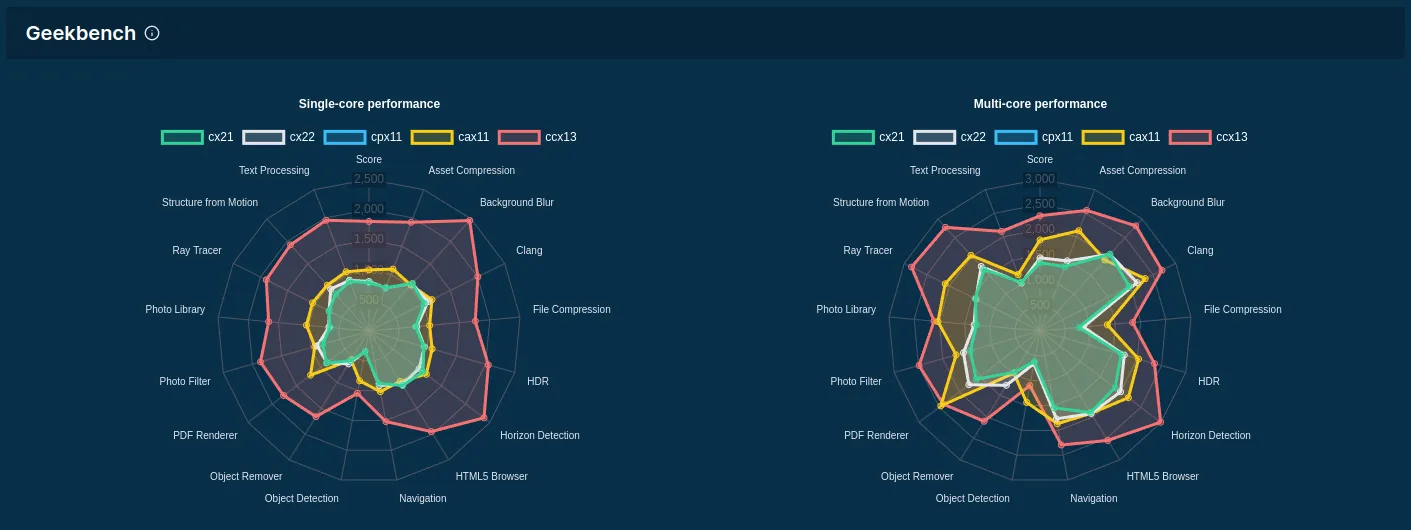
The massive advantage of the dedicated physical CPU core of CCX13 is clearly visible in the single-core results. However, when running the benchmarks on multiple threads, hyper-threading on that single CPU core lowers the difference from the other server types. Nevertheless, the server with a dedicated CPU is the clear winner of this round, with the CAX11 being the second.
When focusing on the difference between CX21 and CX22, we can confirm
the pattern previously seen with the SCore results: the new server offering
has a bit of performance advantage in almost all benchmarking workloads.
CX22 also consistently outperforms CX21 in our memory bandwidth benchmarks, especially with larger block sizes:
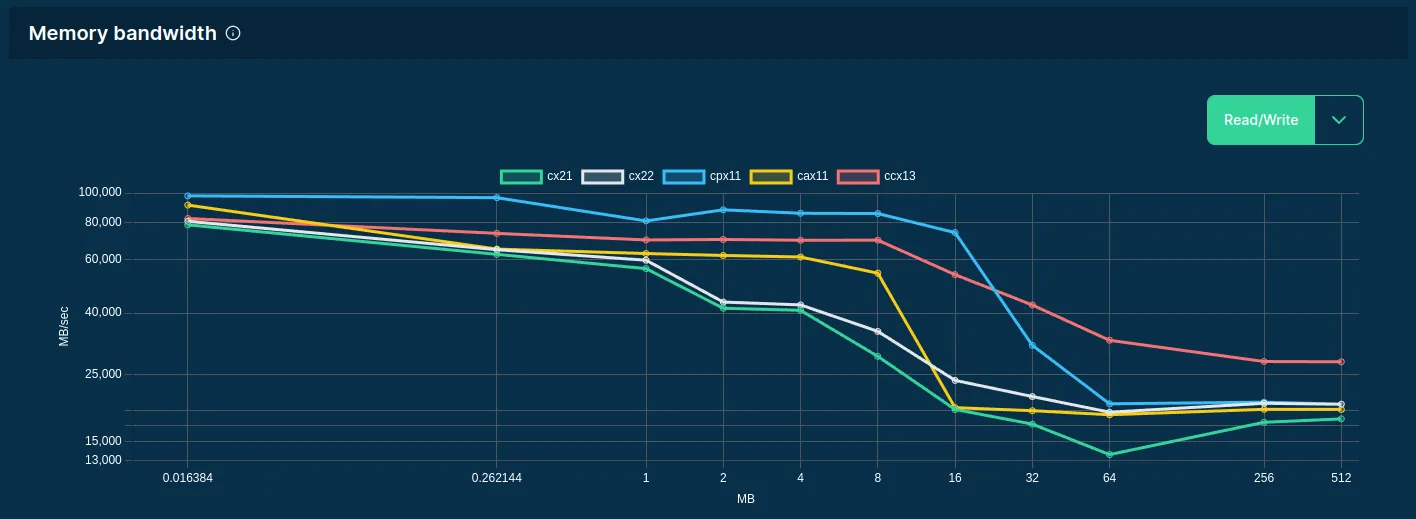
And CX22 is the winner again when it comes to the speed of various OpenSSL hash functions and block ciphers:
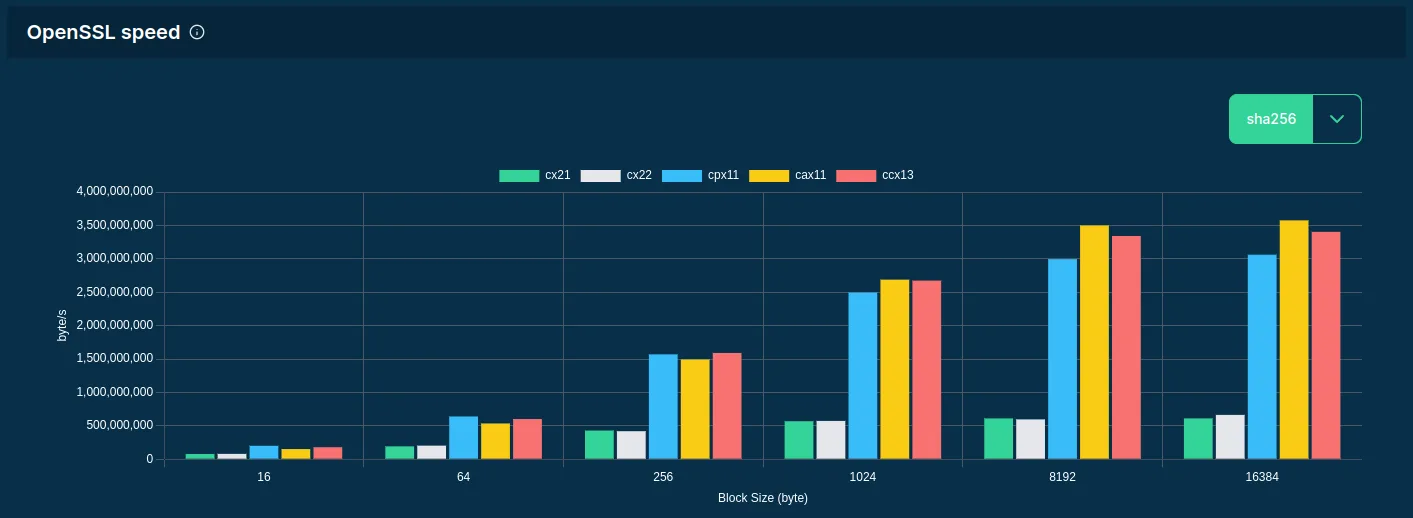
You can see the actual numbers by clicking on the "Show details" button to expand the benchmark scores in a table:
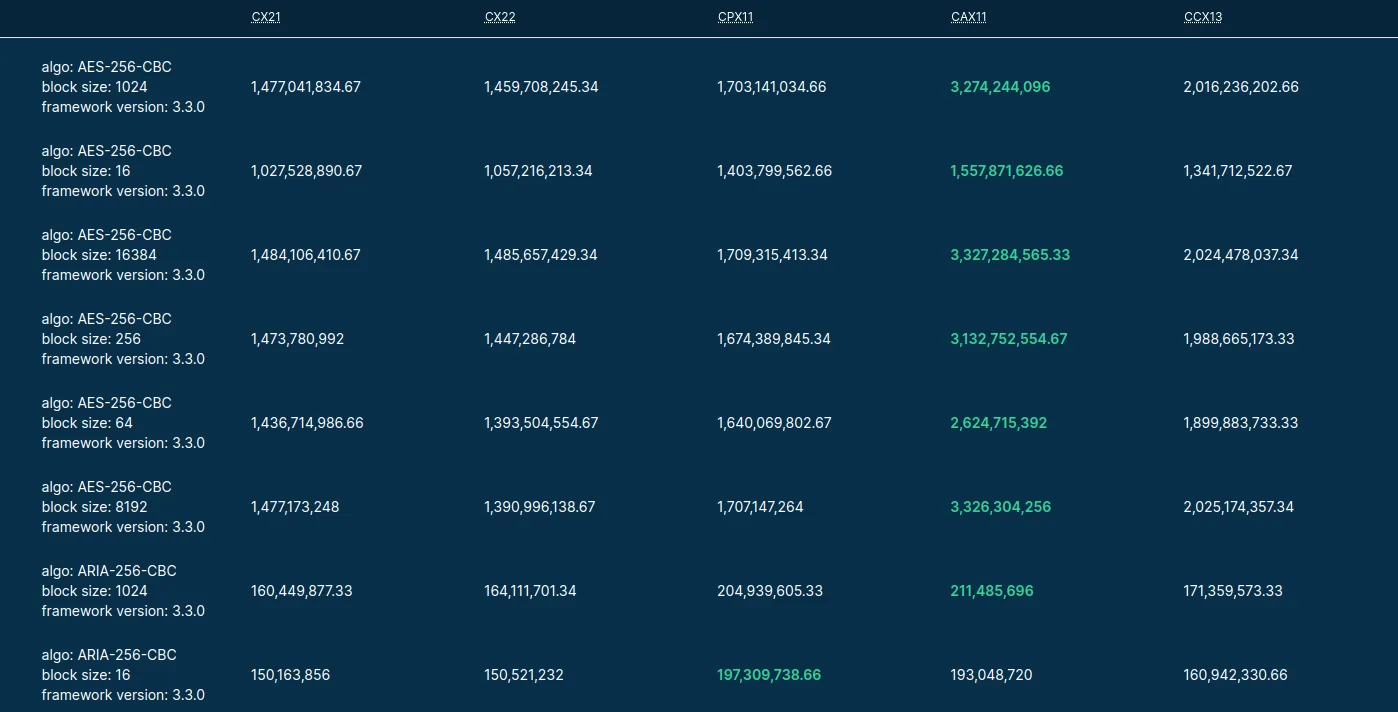
Finally, we observed clear differences in the speed of compression algorithms between the listed servers:
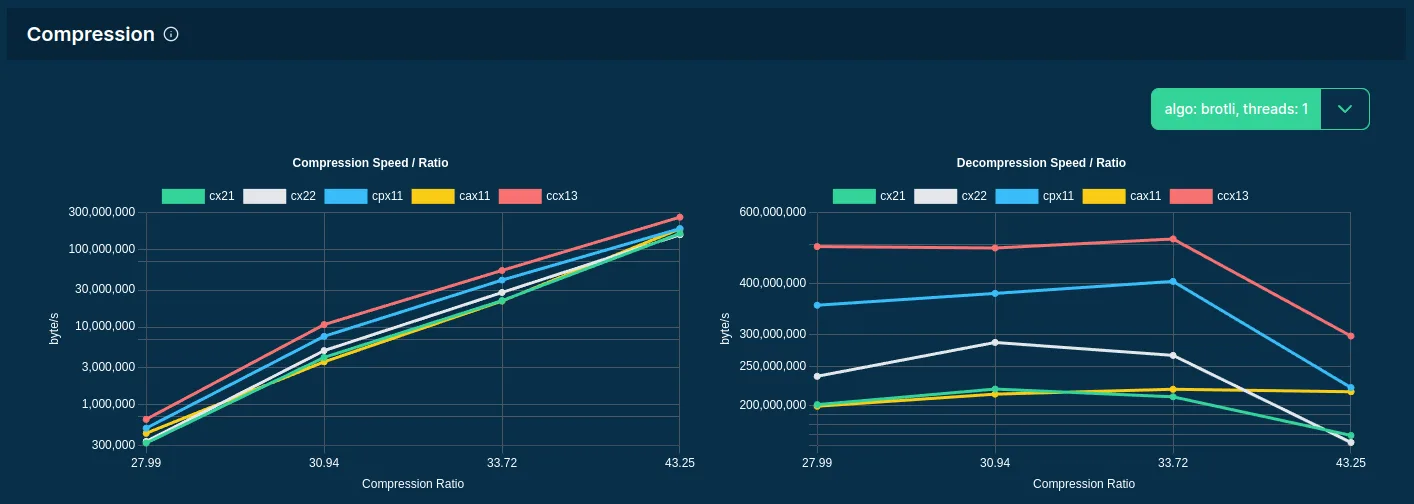
Summary #
Overall, despite acknowledging the precision and reliability of the benchmark scores, we observed a clear trend and very plausible performance boost in the new CX products at a lower price 🙌
Further reading #
You can read more about the above-mentioned benchmarking methods in our "Unlocking Cloud Compute Performance" blog post.
We are currently working on another blog post to analyze the variability of the above-presented performance scores by running benchmarks on multiple independent virtual servers simultaneously and for longer periods (at least a day). Once available, this post will be updated.
Pairwise comparison of the larger CX servers:
